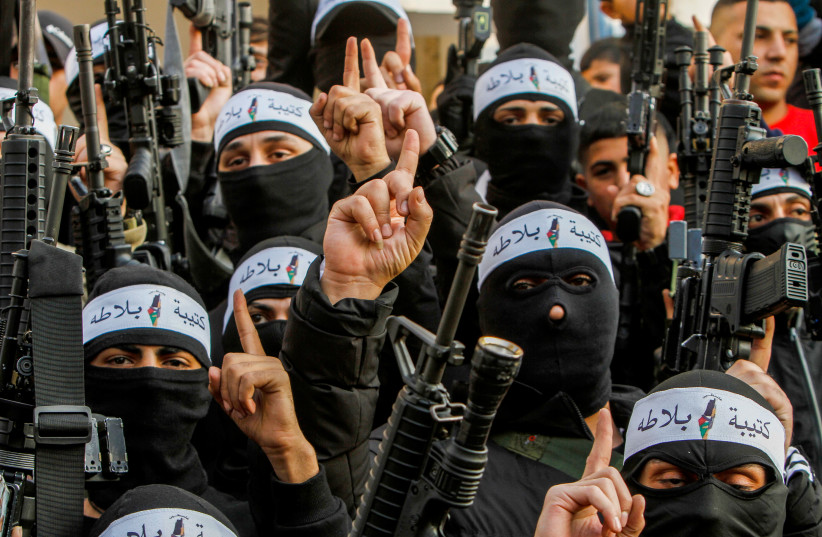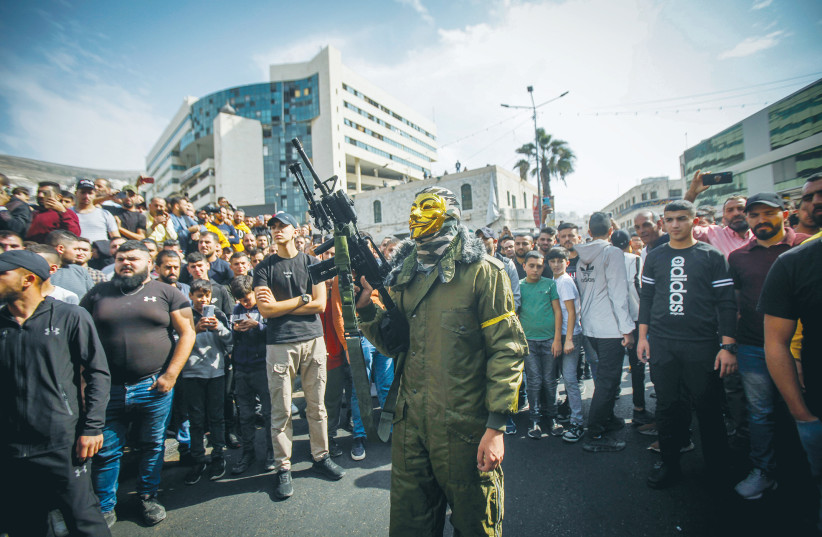Did the IDF operation in Jenin ‘cut the grass’ in West Bank terror?
Earlier this month, Israel tried to alter the playing field and start to bring an end to the waves of terrorism from the West Bank with a massive two-day IDF operation in Jenin.
The true impact of the operation is still too early to assess, and it certainly did not completely end the terrorist waves, but a couple of weeks after, some early trends can be detected.
Discussions with a variety of Israeli sources with knowledge of the Palestinian situation reveal that there are still some fundamental disagreements about the impact of the operation.
One of the largest questions is whether the operation strengthened the Palestinian Authority’s hand in Jenin and across the West Bank or weakened it.
Did the operation strengthen the PA’s hand in Jenin, West Back or weaken it?
 Palestinian gunmen from the Balata Brigade of the Fatah movement’s Lions’ Den groups carry their weapons during a festival in the Askar refugee camp in the West Bank, December 9, 2022. (credit: NASSER ISHTAYEH/FLASH90)
Palestinian gunmen from the Balata Brigade of the Fatah movement’s Lions’ Den groups carry their weapons during a festival in the Askar refugee camp in the West Bank, December 9, 2022. (credit: NASSER ISHTAYEH/FLASH90)Those who think the operation strengthened the PA say that the authority and its president, Mahmoud Abbas, had fallen asleep at the wheel and lost control of Jenin sometime in 2022, if not earlier.
They say that when Abbas visited Jenin at the end of last week, he was taken aback by how out of control the situation was for the PA, even if he had known about it from a distance. Following that visit, they say he decided to strike back in a way that he had not for some time.
Protests from Hamas and Islamic Jihad about his arrests of their operatives testify that something has changed in Jenin, with the PA taking charge at least somewhat more since the operation.
It seems Abbas finally understood from the IDF’s actions and his visit that if he did not act soon, the rebellion against PA authority could spread much wider.
But others disagree and say that Abbas has still only taken limited and symbolic actions with no real staying power.
They say that he no longer has the inner strength, capacity within his security forces, or legitimacy among the wider populace in Jenin and its surrounding villages to maintain full control.
PA is at one of its weakest points
If, some years ago, the PA could have cracked down in a number of West Bank cities a number of times to maintain its own rule, they say the PA is at one of its weakest points ever, and that it is not clear it has the will or power to alter the situation more than in measured ways.
Regardless of Abbas’s intent, there is also a debate about whether a PA crackdown – at this specific moment right after the IDF operation – will increase or decrease the PA’s legitimacy.
Some say that it is just a question of power. If the PA cracks down, it will have shown that it still can, whereas some of its competitors may have thought it had lost this capacity entirely.
In the Palestinian/Arab world, simply the power to crack down can create a kind of legitimacy, though the word means something closer to respect than the Western meaning, which connects legitimacy to human rights.
On this side of the debate, they also say that Hamas is far weaker in the West Bank than some think.
They say that when some experts predict a Hamas takeover in the West Bank like the terrorist group pulled off in Gaza, these experts do not fully intuit how anti-most West Bank Palestinians are to Hamas’s religiosity, compared to Gaza, which always had more religious leanings.
Although the Lions’ Den has a major social media presence and seems very popular from the millions of hits some of its leaders have grabbed, they are viewed as a weak group that is playing games on behalf of Hamas, Islamic Jihad, Iran, or other groups which give individuals small amounts of money to post on social media.
This, in fact, could be said to expose the weakness of the PA’s competitors, who cannot confront it directly in the West Bank. Even in Jenin, Hamas and Islamic Jihad were never in control specifically, as much as there was a wide mix of groups and unaffiliated fighters.
 PALESTINIANS ATTEND the funeral of five terrorists belonging to the Lions’ Den group who were killed by Israeli forces in Nablus on October 25 (credit: NASSER ISHTAYEH/FLASH90)
PALESTINIANS ATTEND the funeral of five terrorists belonging to the Lions’ Den group who were killed by Israeli forces in Nablus on October 25 (credit: NASSER ISHTAYEH/FLASH90)Further, they say that the PA still functions in many key sectors: whether finance, transportation, or medical.
Others say that the timing of the crackdown will harm the PA, that the wider populace of Jenin will be turned more against the PA, and that this could truly lead to Hamas eventually taking over.
There are also questions about whether the IDF will continue to act in Jenin, which could further connect the PA with it as “traitors,” or whether the IDF will take on some new risk for the Israeli public of trusting the PA to crack down on terrorism there.
The IDF has given mixed signals on this issue and may even alter its perspective daily, depending on how much it feels the PA is acting seriously.
THERE ARE also ongoing debates about whether Israel and the IDF can capitalize on “the stick” it just used in Jenin with a big expansive “carrot” to show the Palestinian public that reduced terrorism can improve their lives.
There are already 210,000-220,000 Palestinians working within the Green Line or for Jews in the West Bank, along with around 18,000 Palestinians from Gaza. But there is a general cutoff point, of Palestinians being able to get Israeli work permits only after passing age 27. At that point, the risks of terrorism and the likelihood of wanting to support a family and achieve stability already start to shift.
There is a debate within the defense establishment about whether to lower that age cutoff to 25, something that could dramatically increase the number of Palestinian workers in Israel.
Neither the IDF nor the Shin Bet (Israel Security Agency) would make its position on the issue public.
But senior officers in both agencies have previously pushed for increases in Palestinian workers from the West Bank and Gaza, They have argued that the percentage of terrorist attacks from such persons is close to zero, and that such a policy directly links Israeli and Palestinian economic and stability interests.
In parallel, the Israeli government in late 2021 started to push to have 500 Palestinians employed in Israeli hi-tech companies, not just in the construction and service industries. The number of openings for Palestinians in the hi-tech industries may have even grown now to a few thousand, but only a minuscule number of positions have been filled, due to logistical, cultural, and political barriers.
If the government were to take a more proactive role in trying to resolve these obstacles, it might also reap some serious benefits in stability from the Palestinians, who would see some of their brethren reaching into elite aspects of the dot-com nation.
According to a UN report, around 66% of Palestinians are under the age of 29. This means that a huge and increasing number of Palestinians between the ages of 17 and 29 could be unemployed, which puts them at greater risk to turning to terrorism, if only because they have little else to do. This is within a population of around three million Palestinians in the West Bank.
Another area where Israel could use the “carrot” would be to reduce checkpoints and waiting times at checkpoints.
Numerous studies have said that Palestinians may wait hours daily, or hours when combining the traffic prior to the checkpoint along with moving through the checkpoint itself, to get through.
Some have theorized that Palestinians’ anger and frustration with the checkpoint experience is even more serious than their anger with Israel on broader political land dispute issues, or even their anger over specific disputes between them and nearby settlers.
But anytime Israel removes a checkpoint and there is a terrorist attack, the government is attacked for having removed the checkpoint. This is regardless of whether the kind of terrorist attack would have been preventable by the specific checkpoint in question.
The PA also has an acute economic crisis, which has been worsened by an extended dispute with Israel about conditions for receiving customs revenues.
Aside from resolving that dispute to help stabilize the PA, a large chunk of the debt, around NIS 1 billion, is to the Israel Electric Company.
In the past, Israeli governments have used this debt to alternately pressure the PA, even cutting power, or have massaged the debt, to help stabilize the PA and achieve broader goals.
All of this is without even getting into the elephant in the room – movement by Israel to return to larger-scale diplomatic negotiations with the Palestinians. And it is true that many of the security issues with the Palestinians can only be resolved by the PA and its competitors.
Moreover, defense officials are more concerned than ever about the impact of “the day after Abbas,” who is 88 and perpetually sick, with even top PA officials talking about this more openly than ever. With no clear successor, not only is the future unstable, but that future uncertainty can destabilize the present.
Still, with negotiations remaining unlikely under the current coalition mix, and the PA beyond Israel’s control, there are still quite a few actions that Israel could take, according to defense officials, to try to solidify a more positive aftermath following the massive Jenin operation.





Comments are closed.